Starting college is one of our biggest milestones. It feels like a whole new beginning, as though the adult life we’ve been waiting for has finally arrived! You may feel excited but also scared, embarrassed, and a bit lost too.
To survive these new challenges, you need to know how to get ready, what to avoid, and what to do to maximize success. You’ll find all this and loads more in our experts’ ultimate guide for incoming college students, including beneficial tips and a handy infographic.
🧳 Before You Start: Getting Ready for Your Freshman Year
So, high school is over, and you’re waiting for college to start. What about undertaking arrangements in advance? Doing it will help you prevent common beginner’s mistakes.

Here are our top tips for incoming college freshmen who have just graduated high school. Check them out to ensure your first day of college goes smoothly:
1. Go to College Orientation Events
College orientation is a must. It’s not just a formal compulsory event but also an opportunity to learn more about this new world you’re about to enter.
The duration and specifics of orientations differ from college to college. Most often, they include a guided tour for first-year students. There are also information sessions where you will be introduced to college policies, academic resources, clubs, support services, professors, peers, and more.
💡 Quick Tip:
Write a list of things you want to know beforehand, and don’t hesitate to ask questions.
2. Perfect Your Time Management Skills
Being at college gives you much more freedom but also increases your responsibilities. Time management is one of your most demanded skills now. Though having no strict routine may seem tempting, a well-structured schedule will help you a lot during your first year.
Here are the essential tips that will help you learn how to manage your time:
- Outline your goals clearly.
- Make a schedule with important events and appointments.
- Use a weekly checklist for essential tasks.
- Use breaks in your schedule efficiently (for example, go grocery shopping.)
- Cut down your social media time.
- Reward yourself for reaching your goals.
3. Learn Useful Studying Techniques
The next thing you can do is figure out your preferred study technique and master it in advance. There are many fun and efficient methods, such as color coding, the Pomodoro technique, flashcards, or group study. If you are unsure which option is the best fit for you, try several methods and see what works.
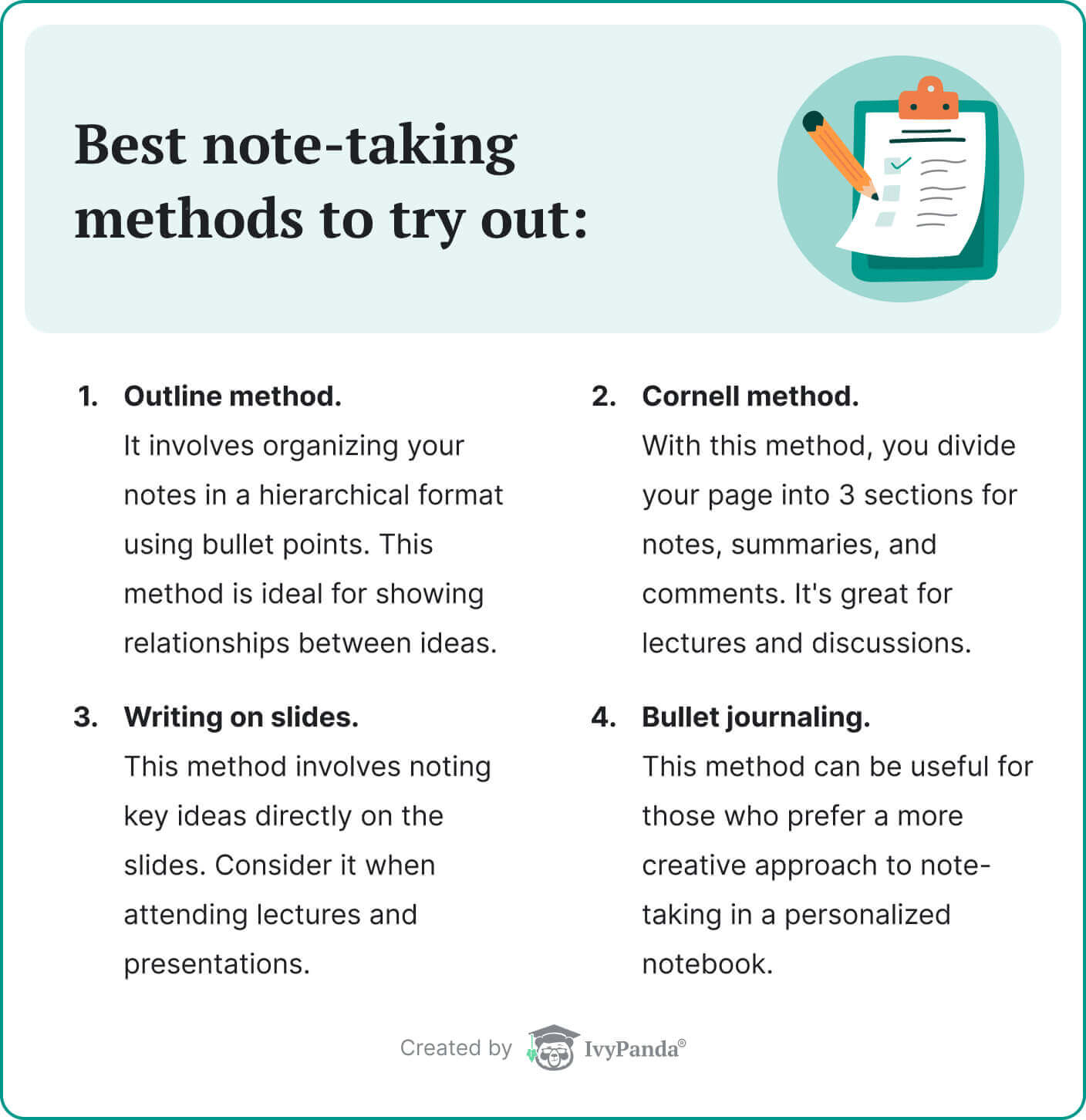
One more thing you definitely need to master is note-taking. Here are some helpful techniques for you to try out:
- Outline method involves organizing your notes in a hierarchical format with bullet points and indentations. It’s great for situations where you must show the relationships between ideas.
- Cornell method goes like this. You divide your page into three sections: a main note-taking area, a section summarizing key points, and another for questions or comments.
- Writing on slides is a great technique to use when attending lectures and presentations that provide a printed copy or a file with slides. This method involves taking notes directly on the slides.
- Bullet journaling is a more creative note-taking method. It involves creating a personalized notebook with your to-do lists, calendar, and notes in one place.
💡 Quick Tip:
Avoid using your laptop to take notes. Even if you are disciplined enough to stay focused, you might find yourself simply copying down your professor’s words without engaging with the content.
4. Think about Essential Safety Measures
Safety should always be a priority. Though campuses may not seem like the most dangerous places, taking precautions is always a good idea.
Make sure to remember the following before starting college:
- Never walk alone late at night.
- Never leave keys to your dorm room lying around, even if you go to take a shower.
- Always use a buddy system when going to a party or meeting new people.
You can also download mobile apps like Noonlight or bSafe. They have a lot of security features to ensure your safety, like tracking your location, summoning emergency help, recording audio and video, and more.
5. Look for Affordable Secondhand Textbooks
Textbooks are expensive! And they are getting more expensive each year. That’s why we recommend you save money by buying used books. You will thank us later.
We recommend you browse these stores to see whether you can find something you need at a lower price:
💡 Quick Tip:
Take good care of your textbooks. You can then resell them at the end of the semester and get some money back!
6. Invest in a Comfortable Pillow and Mattress
To stay healthy and full of energy through a challenging first year at college, you must always get a good night’s sleep. Unfortunately, dorm beds are often uncomfortable, and it’s almost always noisy with so many students around. Take care of yourself by buying a comfortable mattress and pillow.
💡 Quick Tip:
You’re not going to live alone in your room, so we recommend you also pack earplugs and an eye mask—just in case.
7. Map Out Your Classes in Advance
The day your classes start is going to be really busy. To avoid getting lost or, worse, embarrassed, make a detailed plan:
- Think about what classes you’ll have and where they are held.
- Don’t forget about lunch. Can you buy something nearby? Or maybe organize your lunchbox yourself.
- Map out your route before leaving your dorm and make it as detailed as possible.
Doing all these things will leave you more time to get to know other students and make new friends instead of wandering around!
8. Master Smart Storage Solutions
Have you already made a list of things you want to take? We bet it’s pretty long. Here’s the thing: college dorms are really small, and you’ll have to share your room with another person, who’ll probably have a lot of stuff too.
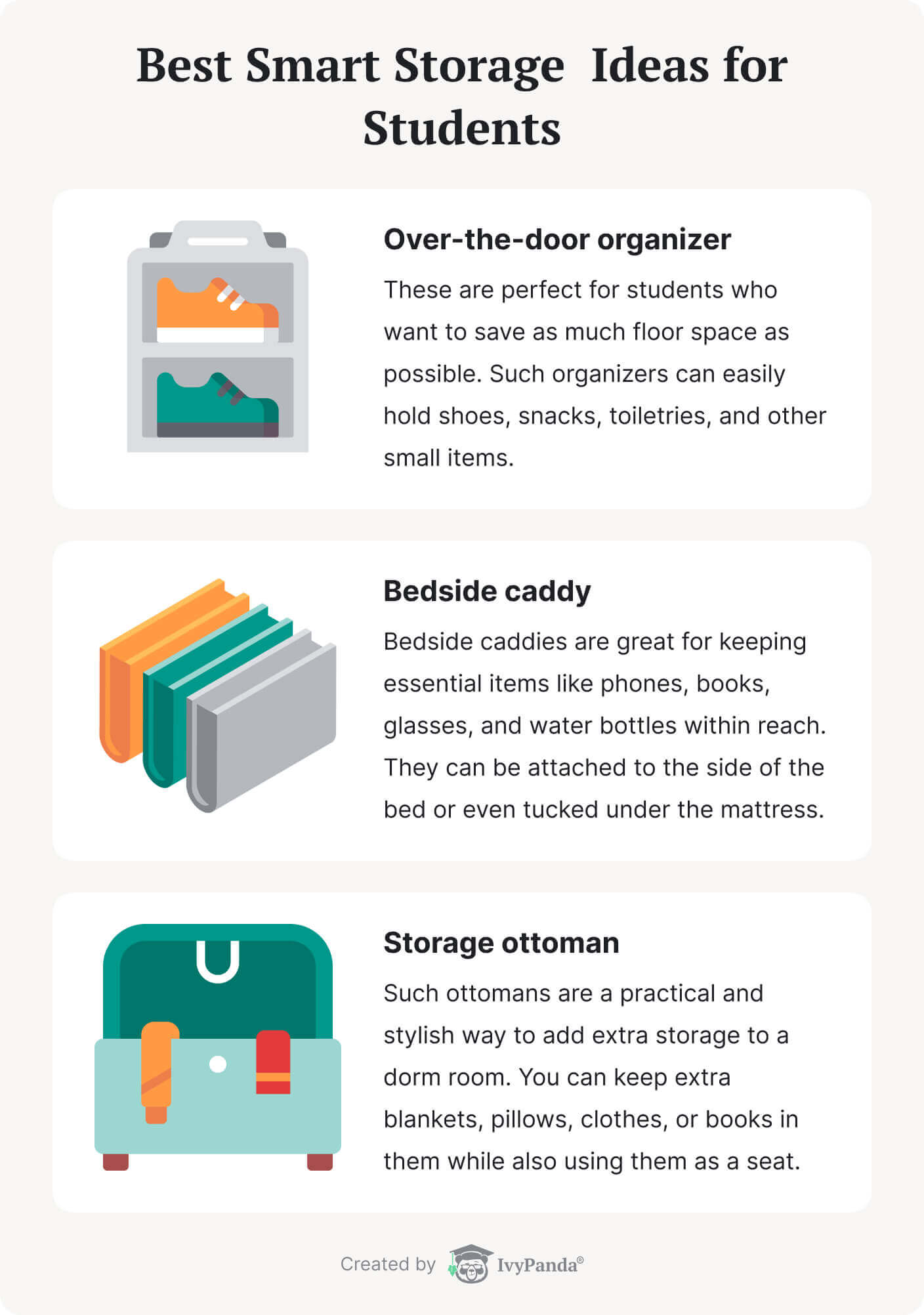
To help you out here, we have two essential tips:
Smart storage is the best way to fit all the must-haves in your room. Buy a few dorm items that help you organize your stuff and maximize your storage space, such as an over-the-door organizer, bedside caddy, or a storage ottoman.
9. Be Positive!
Yes, college is an entirely new experience, and you might feel nervous, especially on your first day. Despite fears, keep a positive attitude and let yourself enjoy it!
🔝 Freshman Year Survival Guide: 15 Tips for Thriving
So, your first day is over, and you’re a full-fledged student now. We bet you are overwhelmed with all the new things in your life—so many classes, people, places, and duties appear in addition to your new independent life.
How are you to survive or, in fact, thrive in all this chaos? Check out these helpful tips for college freshmen from successful students who have been through it all!
1. Go to Class and Strive for Excellence
This is the first and most important rule. After all, studying is the main reason you go to college. Though getting good grades was relatively easy in high school, now you’ll have to really strive for them. So, set your goals and always make an effort!
Skipping classes, especially morning ones, may look tempting. Resist the temptation! First, professors usually remember who shows up to their classes, even if they don’t take attendance. Second, during your classes, you’ll hear a lot of important information you’ll never find in your textbooks. Believe us: it’s absolutely worth it.
2. Connect with Your Academic Advisor
You’re bound to encounter challenges, problems, or conflicts throughout your college years. Luckily, you have a person to help you deal with all that: your academic advisor.
An academic advisor offers valuable advice and helps you throughout your college career. So, we recommend you get acquainted with them and turn to them whenever necessary. Feel free to request another advisor if you don’t get along with the one appointed to you.
3. Join a Club and Explore Campus Life
Being new to college is indeed very stressful. With all the scary new things, your dorm room may look like a safe place you can hide away in. Well, that’s the worst thing you can possibly do!
A person needs friends to be happy and motivated, and college offers you plenty of opportunities to find them. Fraternities, sororities, clubs, and sports teams are great places to meet new people and make new connections.
4. Get Organized
In high school, your teachers usually remind you about due dates. Well, don’t expect that at college. Most professors post the assignments with due dates for the entire semester and expect you to track them yourself.
The best ways you can do this are the following:
- Write them down in a planner;
- Mark them in your wall calendar;
- Use a mobile app, such as Todoist or Trello.
Choose any of these options or all three at once to ensure you remember when and what is expected of you.
5. Eat Healthy Foods
To cope with a busy college life, you’ll need plenty of energy and good health. The best way to achieve that is to watch your eating habits and strive to eat healthy. Here’s some helpful advice for you:
- Eat your breakfast. No matter when you get up, make sure you find time for a healthy balanced meal before going to classes.
- Stay hydrated. Drinking lots of plain water will improve your concentration and prevent overeating.
- Limit your fast food intake. A little fast food now and then won’t harm you, but avoid eating it all the time.
- Choose food rich in calcium. Take care of your future and add milk, low-fat yogurt, cheese, or other calcium-rich products to your diet.
- Limit alcohol and caffeine intake. This is obvious. Too much of both will have a detrimental effect on your health.

6. Watch Your Budget
If you want to avoid getting into financial trouble, you should learn how to budget as soon as possible. These smart budgeting tips will surely help you:
- Keep track of your savings. Knowing exactly how much you have will help you plan your spending.
- Avoid using a credit card. Having one is not always a bad idea, but we don’t recommend it unless you are fully confident you can use it responsibly. If you do use one, always pay on time.
- Consider cheaper dining options. Registering for the college meal plan, shopping for groceries, and avoiding dining out too often can lead to substantial savings.
- Avoid bringing a car to campus. Use public transportation or a bike instead – it will benefit your health and the environment.
- Try to put about $25 in your saving account every month. This way, you’ll surely have some money when you finish college.
- Learn to manage your finances yourself. Having your parents handle your taxes and other financial matters is not a very good idea.
7. Take Advantage of Free Student Perks
Here’s a fun fact: students can enjoy some great discounts! Your student ID gives you access to cheaper airline tickets, shopping discounts, and much more. If you check prices at movie theaters, diners, and other local attractions, you’ll notice they have special offers for students or a designated day when a student can get a good discount.
💡 Quick Tip:
Make sure you also take advantage of the things available on campus. Free movies, lectures, gym memberships, and many other resources are available to you and are already included in your tuition fees.
8. Learn to Get Along with Your Roommates
Conflicts are the last thing you need, especially with your roommate. Your dorm room is supposed to be a relaxing place, not a battlefield. To guarantee you’ll get along with your roommate, remember to show mutual respect, discuss shared spaces and chores early on, and address issues before they escalate.
9. Find Balance and Relax
Your college success consists of two essential parts: your studies and social life. Do your best to find balance and ensure you have enough time for yourself. Your brain needs a break to work as it should. Care for yourself and do things that help you relax, like yoga, journaling, or just watching your favorite TV show
10. Exercise for a Healthy Mind and Body
Numerous studies show a significant decrease in physical activity duration in students during the transition between high school and college. Yes, it may be challenging to fit physical activity into your busy college life. But if you want to stay healthy and energetic, you must find the time.

Here are some key tips:
- Play a sport. Join a club or a team and make sport a fun game instead of a chore.
- Ride a bike. Use it to get around the campus and keep fit.
- Go to the gym. You don’t have to spend hours there; a quick workout is enough.
- Vary your exercises. Try to mix different types of activities to maximize their benefits.
- Make it fun. Bring a friend, choose unusual exercises, and do anything to make your workout fun.
11. Master Your Morning Routines
Waking up early and avoiding morning anxiety is important for a productive day. Here are top tips that will surely help you:
- Put your alarm clock in a place you can’t reach from your bed. This will help you resist the temptation to sleep some more.
- Turn on the lights immediately upon waking to feel more awake. Of course, you should only do this if your roommate is not sleeping or is just waking up.
12. Talk to Your Professors
Freshmen are often terrified of their professors. They may think that college staff will look down on them or treat them like kids.
Well, we’re here to tell you this isn’t true. Most professors respect students and will provide valuable guidance. The earlier you realize this and establish a connection, the better.
Professors won’t hand everything to you in the same way your high school teachers might have done. Build a good relationship with your professor, and you’ll have yourself a good friend and a helpful advisor.
13. Try New Things
Moving to college starts a whole new chapter of your life. It’s the best time to discover and try new things! Here’s why you should do that:
- To pinpoint fulfilling hobbies. Most colleges offer a wide variety of unique opportunities to their students. It’s an ideal way to discover inspiring pastimes to cultivate.
- To refine old interests. Try and explore the new aspects of something you’re already good at.
- To check whether your dream job really fits you. It’s an excellent opportunity to see if your supposed dream jobs actually suit you.
In any case, trying new things will help you to learn more about yourself and help you grow as a person.
14. Make Your Own Choices
College is a time for exploration and discovery. Experiment with your clothes, your hair, or your personal style. Try to change your diet or listen to new kinds of music. It’s your time! Be yourself, and don’t let anyone make your decisions for you.
However, it’s important not to make hasty decisions, especially when it comes to partying. Students should avoid risky behaviors like binge drinking because judgment is impaired. Always remember that and steer clear of such issues.
15. Cozy Up Your Dorm Room
To make your college life more pleasant, transform your dorm room into a comfortable personal space. Here are some quick decorating tips:

- Use cozy bedding with vibrant colors and patterns.
- Decorate the walls with pictures, photos, posters, flags, DIY art, and such.
- Place pine cones or other natural scented items around the room for a pleasant aroma.
- Add rugs on the floor; they’ll make your dorm room much cozier.
Feel free to come up with your own unique dorm room décor ideas!
🚫 What to Avoid as a Freshman
Our freshmen college tips list would be incomplete without discussing some common mistakes students make. Keep reading to learn the typical freshmen traps and how to avoid them!
Procrastination Pitfall
Procrastination is your worst enemy. It steals your time and makes you fall behind in your studies. What can you do about it? Here are some ideas:
- Admit it. Don’t make excuses; just admit that you’re procrastinating.
- Know your triggers. Think about what distracts you from studying and try to eliminate it.
- Remove all distractions. Silence your phone, use earplugs, or play white noise to focus.
- Reward yourself. Give yourself something nice whenever you finish tasks on time.
- Take a break. Use the Pomodoro or any other method to track your breaks and work time to boost your productivity.
Buying Your Textbooks Too Soon
If you hurry and buy all your textbooks in advance, you may spend more money than you need to. College professors often include an exhaustive list of books that are only recommended and not compulsory reading. The best idea is to talk to your professors and discuss which books are actually required for your course.
Overloading Your Schedule
Your first semester is going to be hard anyway. Don’t complicate it even further by overscheduling. Take your time to adjust to new situations and environments. We also recommend you remember to give yourself regular breaks.
We’ve said it before and will say it again: don’t try to add too much to your plate! You may want to go to classes and clubs, take part in social activities, and play sports all at once. But the truth is, you can’t do it all. Prioritize, and feel free to cut back on the things you’re unsure about.
Last-Minute Studying
College studying is much more challenging than high school. You can’t study for only 20 minutes and expect to keep up! Maybe you could do that back then, but college requires an entirely different approach.
What’s important here is to be realistic and give yourself enough time. Starting a project or studying for an exam in advance will reduce stress and lead to better results.
Hoarding Stuff
Dorm rooms are tiny, and trust us: you don’t need all that stuff you plan on taking with you. There’s no need to clutter your space with things that have sentimental value or things you may use only occasionally.
What we do recommend is to take the key necessities. A laptop, phone, stationary, bedding, basic toiletries, clothes, and medications are essential. The rest is optional.
Being Awkward
This often becomes a serious problem for introverts and socially anxious students. They can be shy and insecure, preventing them from opening up and making friends. To relax, some use unhealthy coping mechanisms, like alcohol. But we have some better tips to avoid awkwardness and thrive:
- Attend the networking events your college hosts. It’s the easiest way to meet fellow students.
- Join a sports club or take up a team sport. That’s another simple way to meet people with the same interests as you.
- Don’t sit alone in your lectures. Though it may seem terrifying, sit next to someone and say hi.
- Realize that nobody is judging you. People actually have enough of their own worries and don’t care about you as much as it may seem.
Mismanaging Money
As mentioned, responsible money management is crucial for your success at college. However, students often ignore this and get into financial trouble.
The main mistakes students make are:
- Overspending. This is even easier if you have a credit card. To avoid this, know exactly how much money you have and get rid of your credit card if you see you can’t use it responsibly.
- Not having a money plan. Besides tuition fees, you’ll have a lot of expenses like transportation, books and supplies, social activities, etc. Before your semester starts, make a budget and stick to it.
- Confusing wants and needs. Learning to differentiate between the two will help you stick to your budget.
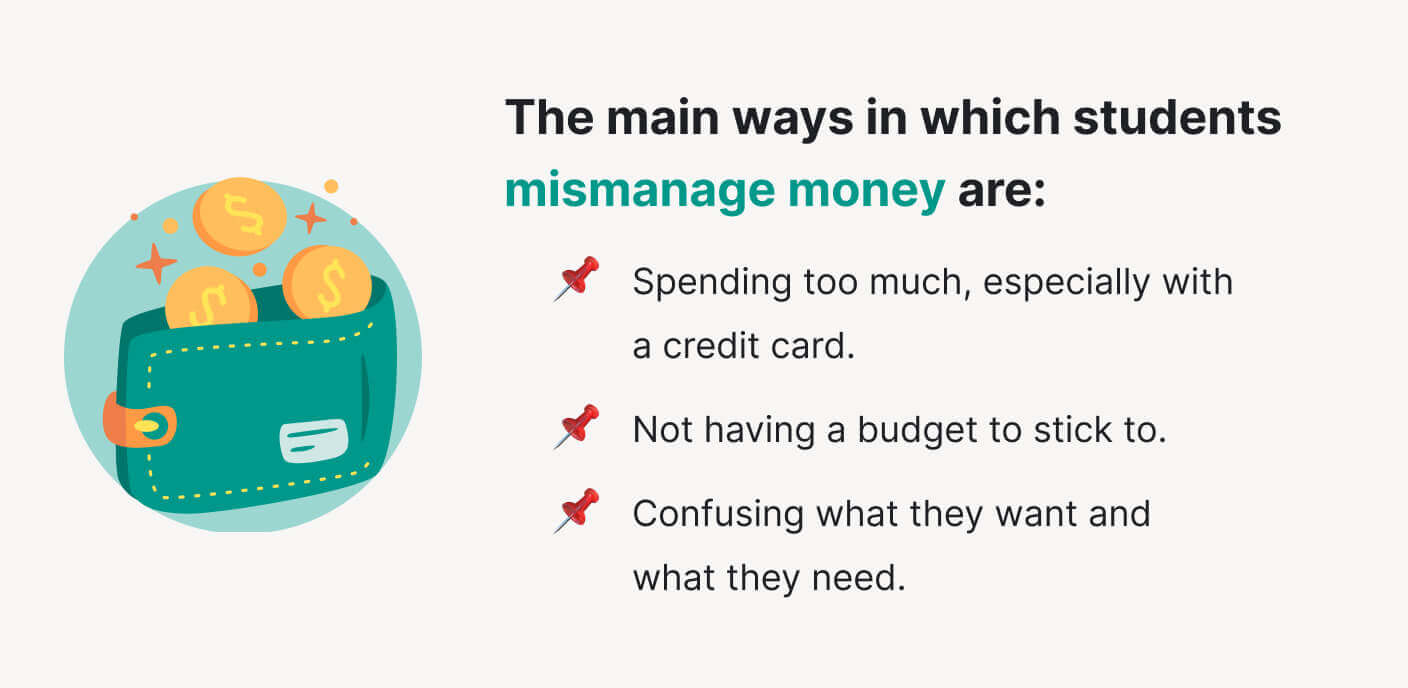
The All-Nighter Lifestyle
We all know the popular stereotype of college students who spend their nights studying or partying rather than sleeping. And though all-nighters will happen, be careful not to turn them into a habit.
Lack of sleep has the same adverse effect as alcohol intoxication. It harms both your physical and mental health. Experts agree that studying during the daytime and getting more sleep before an exam leads to better outcomes.
✨ Tips for Maximizing Your College Success
All students dream about success in college. What can be better than being productive, managing to do everything, and studying subjects that you really like? If you want to maximize your success at college, here are some great tips for you!
Follow Your Academic Aspirations
You’ve chosen your academic major but are now unhappy with your decision. That’s fine! As mentioned, college is about finding what fits you best. You can change your major if you aren’t satisfied with it. According to National Center for Education Statistics, 80% of students do this at least once.
The process of changing a major may differ depending on the college. We recommend contacting your academic advisor, who can give you some helpful hints on choosing your new major and explain the switching process.
If you’re ambitious and feel like one major is not enough, go ahead and pursue a double major. Usually, students choose a second major in a field that complements the first one, like Biology and Psychology.
💡 Quick Tip:
What if the majors available don’t satisfy you? Well, you can try to create your own major! This will require some work and close cooperation with your advisor. But trust us: you won’t regret it.
Start Preparing for Your Career
You can start preparing for your career right from your first year in college. If you do that, you’ll finish your education with some professional experience in your resume. Besides, it’s an excellent way to earn extra money and build professional relationships.
Here are some options you might want to explore:
- A part-time job. This is a perfect option if you can find something related to your career aspirations. Besides, having a job will significantly improve your time management skills.
- An internship. Students usually consider this option in their junior or senior years, but freshmen can also apply. There are two types of internships: paid and unpaid. Whichever you choose depends on your goals and financial situation.
- A federal work-study job. This is a government program that offers you work related to your course of study.
- A “warm-body” job. If you can’t find anything related to your field of study, find something that allows you to do your home tasks while working, such as helping a librarian.
- Summer orientation for incoming students. This job type is a great way to build confidence and develop communication skills.
Study Smart
A phone and laptop are invaluable instruments for your study. They allow you to access the internet and study no matter where you are. Unfortunately, too much of a good thing can also do a lot of harm to your concentration and productivity. Here are a few ways to prevent possible negative impacts:
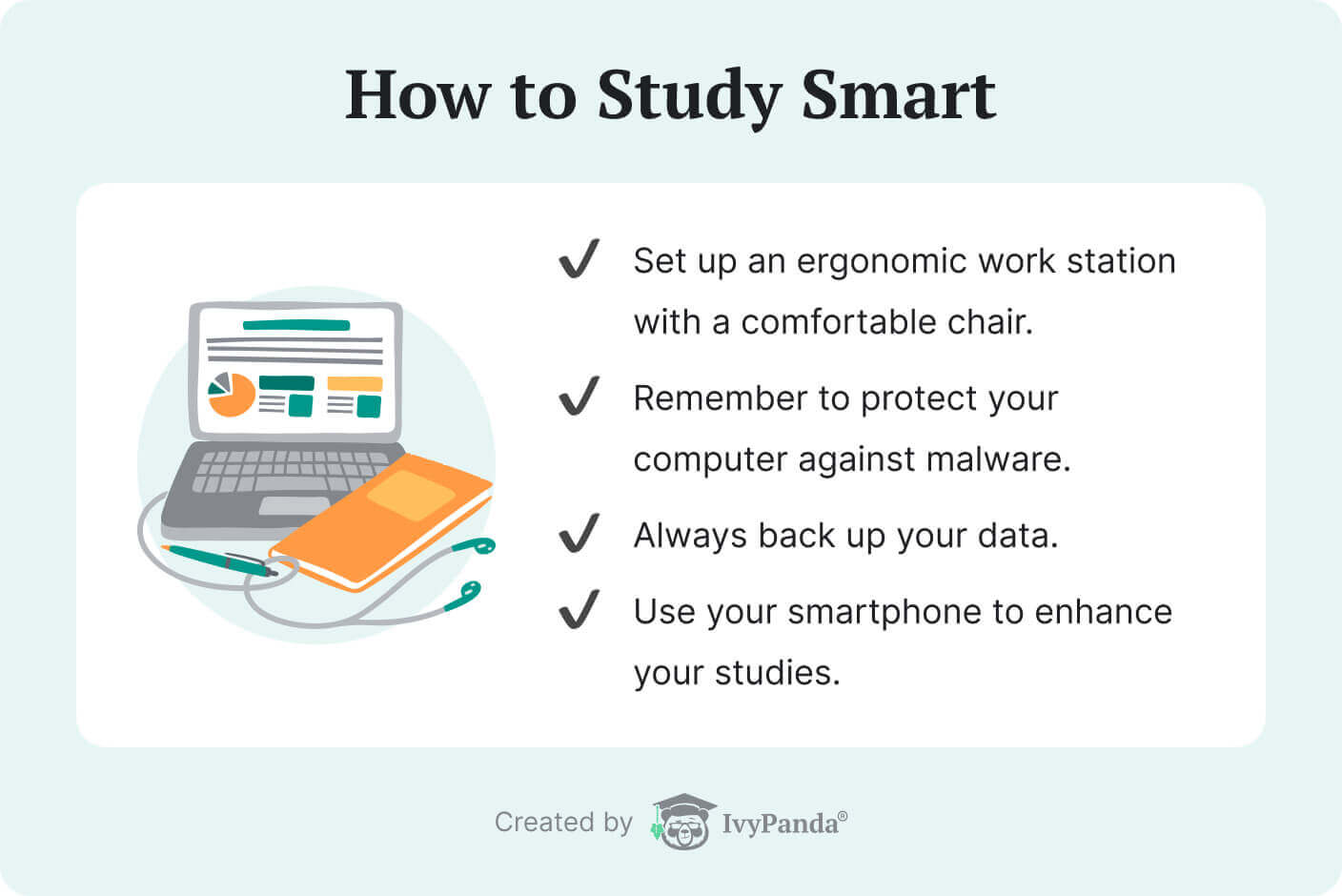
- Organize an ergonomic workstation in your room. This must include a desk that keeps your monitor at least 20 inches away from your eyes and a comfortable chair. Having a place designed only for work is crucial, especially if you take online classes.
- Working with a computer, never forget to protect it against malware. Windows Defender, antivirus programs, and ad blockers will make your work safer and much more comfortable.
- Another critical point is always to back up your data. The information copied to a flash drive, external hard drive, or cloud-based application can save you hours or even days of hard work in case the original files get corrupted.
- Turn your smartphone into your helper. Use reminders and alarms to monitor important deadlines, a task management app to organize your work, and an app blocker to avoid distractions.
Stay Productive
Staying focused and productive is essential for thriving in college. Check out some practical habits that’ll help you stay organized and cope with tons of tasks:
- Track your time. Time tracking will show you what you are spending your time on. For more efficient studying, break your projects into smaller tasks and track how much time you spend on each.
- Make a plan. Use mobile apps or a pen and notebook to create a to-do list. Once you’ve noted them down, you can focus on completing these tasks.
- Mute the noise. It’s hard to focus when your phone keeps buzzing all the time. Put your phone on mute when you study; you can check all the messages and notifications after your work is done.
- Practice active recall. This is perhaps the most efficient way to memorize a lot of information.
- Stay focused. The Pomodoro technique or its variations is the easiest way to do this. The 25-minute work sessions and 5-minute breaks will help you make progress without wasting time.
- Make a timetable. This is vital before exams. Break down your work into small parts and dedicate a specific day and time to complete each.
- Take notes. We know, it’s obvious. Notes taken at lectures help you focus on the material and are an invaluable resource for exam preparations.
Best Apps for Boosting Productivity
Do you want to boost your productivity further? Try out popular productivity applications! We’ve gathered a list of the best apps to help you organize your work and manage your time wisely.
Top apps for organizing your work:
- Google Sheets. This is an easy and handy way to make a schedule you can access on all your devices.
- Evernote. This note-taking app has many useful features like digital notebooks, to-do lists, a document scanner, text extraction from images, and more. Keep in mind that many of the features require a paid subscription.
- Habitica. This RPG-styled productivity app can turn a dull to-do list into a fun game.
- Good Notes. This app can scan and mark real-world documents, write notes, create flashcards, and more. The main perk of this app is the wide selection of pen styles and colors you can pick from.
Handy applications for effective time management:
- Pomodor. This is a simple web-based timer app to help you focus on a task. You can customize the length of work and break times to create a personal work rhythm.
- Forest. Plant a tree in your in-app forest whenever you start a study session. The tree will grow while you’re working, but if you leave the app before your study session is over, your tree will perish. It’s more than just a creative way to improve your concentration skills. And yes, the company plants real trees, too.
- Cold Turkey. This app blocks accessing distracting websites, games, and apps while you work. The distractions stay blocked until your work is complete. The main drawback is that you can’t install it on your phone.
- RescueTime. The free version of this app tracks and categorizes time spent on activities. With the paid version, you’ll be able to block distracting websites. You can install the app on both your computer and mobile device.
🍃 Mental Health & Wellness Tips for College Freshmen
The college years are supposed to be some of the best years of our lives. But unfortunately, they can also be some of the most stressful. Exams, deadlines, social pressures, and new responsibilities often cause students’ mental health to suffer. The consequences can be extremely serious.
While college life is nerve-racking, especially for newcomers, following our tips will help you maintain your physical and mental health despite the demands.
Learn to Be Mindful
Mindfulness means being completely aware of the present moment. It’s a fundamental component of mental wellness. If you want to try practicing mindfulness, start with meditation. Try focusing on something repetitive like a mantra or your breathing. Regular meditation will help you relax and reduce stress and anxiety.
💡 Quick Tip:
You can even go further and practice mindful living: a lifestyle that requires continuous full awareness of what you’re doing. But don’t try to change everything at once: start with the areas needing the most improvement.
As a student, you can begin by practicing mindful listening or reading. Once you’ve mastered one area, move on to the next, and you’ll notice your mental health getting better.
Set Realistic Goals
Most students start college wearing rose-colored glasses thinking everything will be idyllic. They attempt too much at once – academics, social lives, relationships, extracurriculars – confident they can balance it all. Such lofty optimism is sometimes called the freshman myth.
The freshman myth may seem harmless. After all, what’s so bad about being confident? But when students realize they can’t meet their expectations, the consequences can be catastrophic. According to the National Student Clearinghouse Research Center, 20% of college students drop out after their first year because reality failed to match their ideals.
Want to avoid this happening to you? Here are a few simple tips:
- Set specific, achievable goals like attending all classes or joining a particular club.
- Create a daily to-do list with small steps, including personal hygiene and exercise, and mark them off when achieved.
- Add “fun goals” to your list, like watching a soccer match or spending a weekend with friends.
Practice Self-Compassion
Students often dramatize and catastrophize their mistakes. Many even believe that constant self-criticism will motivate growth and perfection. However, in reality, it just destroys their mental health and affects their quality of life.
Going to college is an excellent opportunity to change this pattern and practice self-compassion instead. The main focus of a self-compassion practice is to treat yourself as you would treat a person you care about.
Try to follow these steps:
- Ask yourself how you would treat and comfort your loved one in an unhappy situation.
- Speak to yourself with the same understanding and empathy you would speak to others.
- Remind yourself that humans are imperfect and other people make the same mistakes.
- Remember that truisms about learning from mistakes may seem cliché, but it doesn’t make them false.
- Re-read the part of this article about being mindful and practice it every day.
Establish a Healthy Routine
Having a routine will help you significantly improve your mental health. It gives you the feeling of purpose and control. A list of pleasant, consistent activities you do every day at the same time will also help you stay grounded.
Check out some healthy habits you may want to incorporate into your daily routine:
😴 Stick to consistent wake up and bedtimes.
🛏️ Create a relaxing pre-bed routine (e.g., meditation, listening to relaxing music, and setting the alarm) to signal your brain it’s time for sleep.
🏋️ Exercise at the same time daily to make working out a habit.
Think about any other enjoyable and stress-reducing activities and add them to your routine. The healthy lifestyle habits you develop in college will help you build discipline and ultimately do you a lot of good.
Find Your Tribe
After moving to campus, you may feel lonely at first. That’s why it’s essential to make supportive friends who will help you grow. Introduce yourself to dormmates, ask about their lives, and invite them to eat in the cafeteria together.
Most freshmen feel isolated and will be delighted to have someone to talk to, so don’t be shy.
The best way to make some new friends is to join a club. Though it sounds trite, it works. Spending time together working on a shared activity helps develop strong connections and make your college a more welcoming place.
Ensure a Good Night’s Sleep
Sleep is paramount to your physical and mental health. A lack of it makes you irritable and decreases your concentration.
We’ve already mentioned the benefits of a good mattress and pillow and creating your bedtime routine. Here are some additional tips:
- Take a short nap during the day, but not too close to bedtime.
- Remember that your bed is for resting, not working; never do your tasks there.
- Aim to regularly sleep 7 to 9 hours per night.
- Refrain from eating or drinking right before bed.
- Make your room as cool, dark, and quiet as possible at bedtime.
Cope with Homesickness
Homesickness is widespread among freshmen. The National Institute of Health states that 70% of first-year college students feel homesick, and 57% feel excluded from campus life. Yearning for home can develop into a substantial problem that won’t just disappear by itself.
If you have this feeling, try following our tips:
- Become familiar with your new surroundings. Explore your campus to find places you’d like to eat, study, or relax.
- Join clubs and organizations. Fill your free time with activities you enjoy and meet new people.
- Talk to college counselors. They are professionals and know how to help you.
- Call your parents. They’ll be happy to hear from you and support you.
Remember that it’s possible to survive homesickness in college using healthy coping mechanisms.
Avoid Getting Lonely
Loneliness and homesickness go hand in hand. Both often arise in unfamiliar surroundings and can harm your mental health and academic success. Use our tips to improve the situation:
- Share your feelings. Don’t bottle up your loneliness: instead, talk about it with your peers. There is nothing to be ashamed of; almost every freshman feels the same way; almost every freshman feels the same way.
- Hang out with your real-life friends. Your social media followers, no matter how numerous they are, will never substitute the real flesh-and-blood ones.
- Leave the dorms. Isolation and loneliness go together. To combat loneliness, you should communicate with people and leave your room.
Fight Depression
Depression is extremely widespread among college students. According to the Higher Education Research Institute, about 63% of all students feel depressed after entering college. Moving to a new place, adjusting to a different social circle, and adulthood can be overwhelming and lead to serious mental health issues.
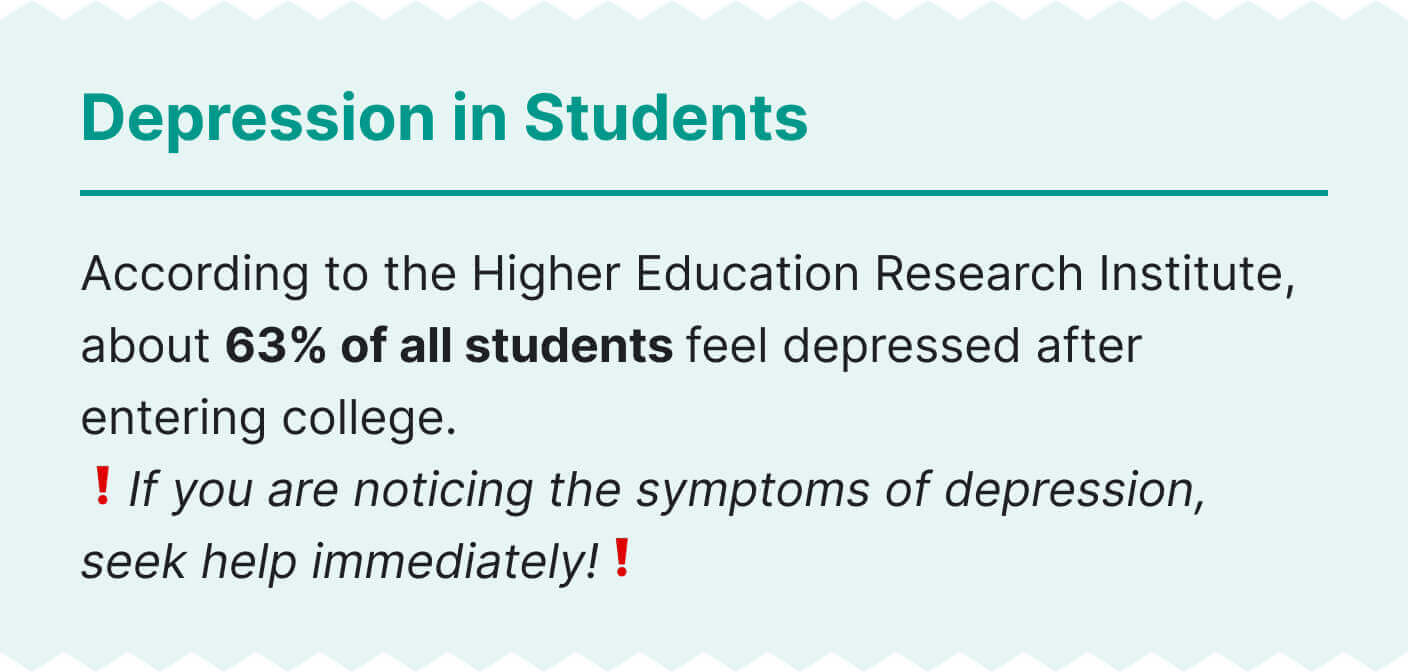
The key is to be able to differentiate depression from temporary sadness. Watch out for these symptoms:
- constant irritability;
- a lasting feeling of sadness or hopelessness;
- losing interest in activities and hobbies that used to give you pleasure;
- sleeping disorders;
- constant feelings of fatigue;
- restlessness;
- a sense of guilt;
- regular thoughts of death and suicide.
If you’ve noticed most of these symptoms, immediately ask for help! College experts are there for you. The sooner you realize something is not right and seek help, the sooner you’ll return to your regular life.
We also recommend you browse our list of mental health resources for students. You may find something related to your condition and find the type of help you need most.
️🖼 Infographic: College Freshman Tips
We are sure our tips will come in handy during your exciting first year! We’ve put them all into a neat infographic that you can save to your computer. Check it out!

🎁 BONUS: 6 Surprisingly Useful Insider Tips
Here is a helpful bonus for those who read until the end! This is a list of invaluable practical college tips for freshman students that are rarely talked about, but we’re sure you’ll definitely need them.
1. Watch What You Post Online
A college is not that big. When you post something you shouldn’t, everyone on campus will know about it, and you might get into trouble. College admissions officers often monitor applicants’ social media profiles and can revoke an admission offer if they find the content inappropriate. Even worse—your future employers can see your posts too. So be mindful and ensure you don’t ruin your long-term prospects.
2. Enroll in the Most Unusual Courses
Colleges often offer a lot of unusual and unique classes. Try some of them, even if they have no relation to your major, and have fun!
Here are some examples of unexpected courses:
- Wasting Time on the Internet from the University Of Pennsylvania;
- Surviving the Coming Zombie Apocalypse from Michigan State University;
- Game of Thrones from University of Virginia.
Check out what your university offers!
3. Don’t Let Visitors Use Your Microwave
Or at least supervise them while they do it. You never know what they’re going to put inside. A mishap can result in a full day of cleaning or even having to buy a new microwave.
4. Use the Weekday Laundry Strategy
Most students plan to do their laundry on weekends. What’s the result? High competition for the machines, your clothes on the floor (or in a puddle of bleach if you leave them unsupervised.) To avoid this, we recommend you plan to do your laundry on weekdays. Make the most of your time by reading or working on assignments while the machine cycles run.
5. Don’t Leave Your Clothes in the Laundry
Pick them up the moment your washing and drying are done. Firstly, not doing so is rude. Other students are probably waiting to use the machines. Secondly, some people don’t like waiting. They’ll take your clothes out and put them somewhere else. And if you leave your clothes for long enough, chances are you’ll never see them again.
6. Flip-Flops Are a Must
Always wear your flip-flops when you take a shower. Foot fungus is a rampant and irritating problem. If you’ve forgotten to pack your flip-flops, buy some, they’re cheap.
Now, you’re prepared to face your first year of college. It’s going to be great! Good luck, and have fun! If you find these tips helpful, share them with your friends.
🔗 References
- Study Tips for Your First Year in College: American Society for Microbiology
- 5 Lessons I Learned My Freshman Year of College: University of Arkansas
- 5 Tips For College Freshman To Help Maximize Year One: Forbes
- The Biggest Mistake I See College Freshmen Make: Slate
- What Piece of Advice Would You Give to Your Freshman Self?: Marquette University
- Freshman Study Tips: Ball State University
- 22 Tips for First-Year College Students: Psychology Today
- The Top 5 Tips for College Freshman from a Bestselling Author: WFSB
- College 101: 7 Tips to a Successful Freshman Year: The University of Alabama at Birmingham
- Healthy Tips for the College Freshman: American Academy of Pediatrics
- Five Pieces of Advice for Incoming Freshman: Utah State University
- 21 Tips Every First-Year Student Should Know: Maclean’s Education
- Successfully Transition to College Life with These Tips: University of South Florida
- Helpful Tips to Avoid the “Freshman 15”: Healthline
- A College Freshman’s Take on Freshman Year Advice: Niche
- Advice to My College Freshman: The New York Times
- How to Succeed Academically and Socially as a College Freshman: Advice from Recent Grads and Last Year’s Freshmen: LinkedIn
- Top Ten Freshman Year Issues: Mental Health America
- One Month Down, Eight to Go: Advice from College Sophomores on Surviving Freshman Year: North Jersey
- 5 Pieces of Advice I Wish I Got as a Freshman: Georgetown University
- 101 Health and Wellness Tips for College Students: Rutgers University
- 8 Ways to Sustain Health and Wellness as a College Student: Chapman University
- Studying Survival Tips: University of Connecticut
- Health and Wellness Tips: Cornell University
- Winter Health & Wellness Tips: University of Nebraska–Lincoln
![Your First Year of College: How to Prepare & Be Successful [+ Infographic]](https://ivypanda.com/blog/wp-content/uploads/2023/03/shocked-fuuny-young-female-wonk-stares-notebook-carries-pen-has-piles-papers-workplace-wears-spectacles-striped-clothes-736x491.jpg)


